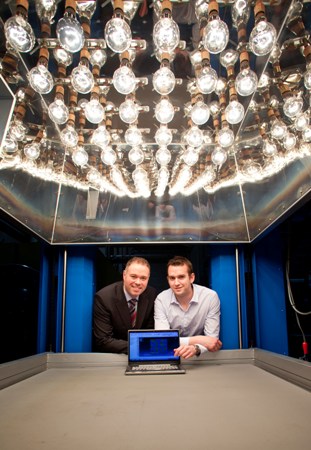Dec 5 2012
Researchers at the Materials and Surface Science Institute (MSSI) have developed a highly advanced software tool ‘Composite MicroMechanics (COMM) Toolbox’ to test failure rates in composite materials. Composite materials are used in high performance products, such as aircraft, sports cars and yachts, and are now making their way into everyday products. The software has been licensed to 12 countries so far including US, Canada, China.
 Dr Conor McCarthy and Dr Ted Vaughan, University of Limerick.
Dr Conor McCarthy and Dr Ted Vaughan, University of Limerick.
The worldwide composites industry is expected to grow 6% per year for the next four years, from €68 billion in 2010 to €90 billion in 2015. With this forecast growth in composites usage, the need for novel composites design tools, such as the COMM toolbox, is a key requirement to ensure increased usage and more importantly increase Europe’s and Irelands market share in the industry.
Lead researcher and co-inventor, Dr Conor McCarthy, MSSI explains; “Product designers urgently need accurate design tools to help them understand how composite materials behave in harsh environments. This allows them to predict what impacts or pressures the material can sustain, without causing component failure. This information is vital for ensuring safety of across a wide range of composite-based products, from aircraft bodies to computer casing equipment.”
The COmposite MicroMechanics (COMM) Toolbox was invented by Dr. Conor McCarthy and Dr. Ted Vaughan at the University of Limerick, and its development was funded by Science Foundation Ireland and the Irish Research Council. The software tool has generated interest by the design community and licenses for its use are now being all around the world. The COMM toolbox is the only one of its kind in the market, and its key advantage over other composites design software is that it shields the user from having to be an expert in composites failure theories. All the know-how in failure of composite materials built up at the University of Limerick over the last two decades is imbedded in the code. Users can simply draw on this experience, without having to understand all the complex algorithms that form it function. The toolbox is now being used to design aerospace grade bonded joints, which have to withstand loads equivalent to the weight of a large family car.
The University of Limerick hosts the Irish Centre for Composites Research (IComp), which is the national centre for composites research in Ireland, and has 14 industrial partners including, Bombardier, Henkel, Cavanagh Foundry and Turas Composites. The centre was established in 2010 under the Technology Centre initiative of Enterprise Ireland and IDA Ireland. IComp's mission is to underpin the growth of the Irish composites industry through research focused on the critical requirements of a number of industrial sectors including aerospace, automotive, renewable energy generation and construction. One main mission of IComp is to patent and license new composites technologies, for which the COMM toolbox is one.
The IComp Director and Technology Leader Dr Terry McGrail says “The COMM toolbox is an excellent example of taking fundamental composites research from the lab to the marketplace. Such tools make designing composite structures and materials much easier, and so significantly promote their use in industry, both nationally and internationally. Ireland is already strong in software development; it is exciting to see us making headway into the composites design space using indigenous software”.